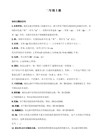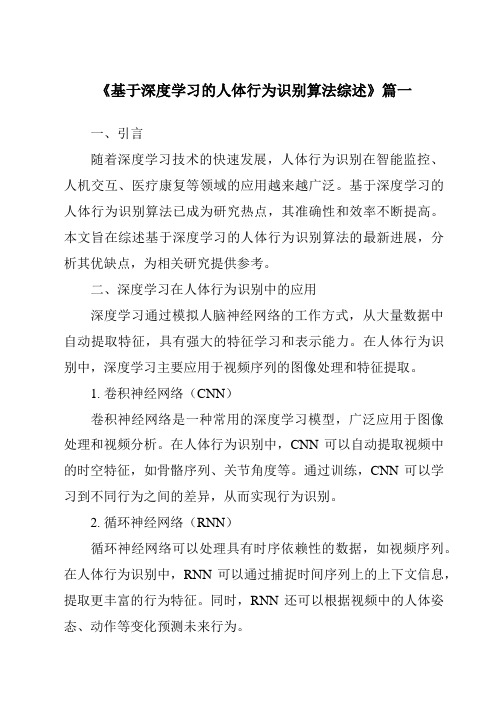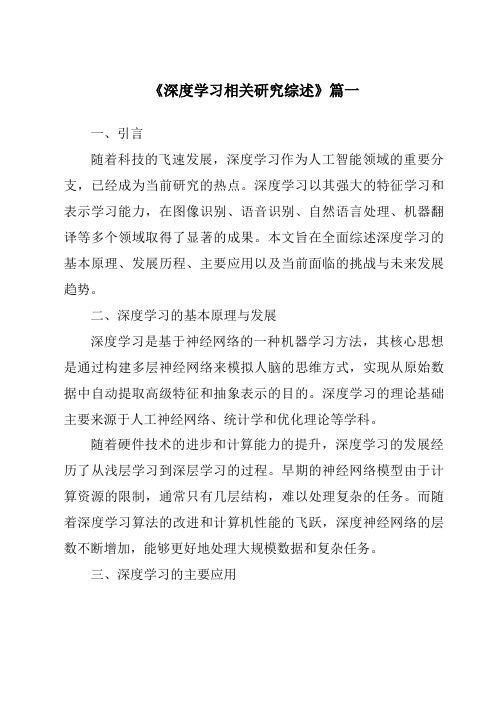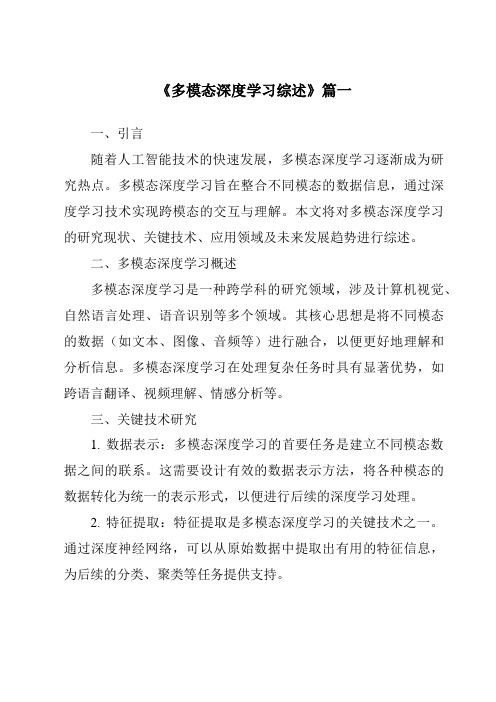深度学习-综述
《2024年深度强化学习理论及其应用综述》范文

《深度强化学习理论及其应用综述》篇一摘要:深度强化学习作为人工智能领域的一项重要技术,结合了深度学习和强化学习的优势,为解决复杂问题提供了有效的方法。
本文综述了深度强化学习的基本理论、发展历程、关键技术及其在各个领域的应用,旨在为读者提供一个全面而深入的理解。
一、引言深度强化学习是人工智能领域的一个新兴分支,它结合了深度学习和强化学习的优点,通过在模型中引入神经网络来处理复杂的决策问题。
近年来,深度强化学习在多个领域取得了显著的成果,成为人工智能领域的研究热点。
本文将对深度强化学习的基本理论、发展历程、关键技术及其应用进行综述。
二、深度强化学习基本理论深度强化学习是强化学习与深度学习的结合,其基本思想是通过神经网络来逼近决策过程,并利用强化学习的反馈机制进行学习。
在深度强化学习中,智能体通过与环境交互,学习到一种策略,以最大化长期回报。
该过程包括感知环境状态、选择动作、接收反馈和更新策略等步骤。
三、深度强化学习的发展历程深度强化学习的发展经历了从简单的基于值函数的方法到复杂的基于策略梯度的方法的演变过程。
早期的研究主要关注于如何将神经网络与强化学习相结合,以解决简单的决策问题。
随着深度学习技术的发展,深度强化学习开始在复杂问题上取得突破性进展。
近年来,随着算法和计算能力的不断提高,深度强化学习在多个领域的应用取得了显著成果。
四、关键技术(一)神经网络:神经网络是深度强化学习的核心组成部分,它能够处理复杂的感知和决策问题。
常见的神经网络结构包括多层感知机、卷积神经网络和循环神经网络等。
(二)值函数逼近:值函数逼近是深度强化学习中的一种关键技术,它通过逼近价值函数来指导决策过程。
常见的值函数逼近方法包括基于监督学习的回归方法和基于无监督学习的自编码器方法等。
(三)策略梯度方法:策略梯度方法是另一种重要的深度强化学习方法,它直接对策略进行参数化并利用梯度信息进行优化。
这种方法在处理复杂问题时具有较高的灵活性。
深度学习(Deep Learning)综述及算法简介

Yoshua Bengio, Pascal Lamblin, Dan Popovici and Hugo Larochelle, Greedy Layer-Wise Training of Deep Networks, in J. Platt et al. (Eds), Advances in Neural Information Processing Systems 19 (NIPS 2006), pp. 153-160, MIT Press, 2007
The ICML 2009 Workshop on Learning Feature Hierarchies webpage has a list of references.
The LISA public wiki has a reading list and a bibliography.
Geoff Hinton has readings from last year’s NIPS tutorial.
对于表达sin(a^2+b/a)的流向图,可以通过一个有两个输入节点a和b的图表示,其中一个节点通过使用a和b作为输入(例如作为孩子)来表示b/a ;一个节点仅使用a 作为输入来表示平方;一个节点使用a^2 和b/a 作为输入来表示加法项(其值为a^2+b/a );最后一个输出节点利用一个单独的来自于加法节点的输入计算SIN的最长路径的长度。
传统的前馈神经网络能够被看做拥有等于层数的深度(比如对于输出层为隐层数加1)。SVMs有深度2(一个对应于核输出或者特征空间,另一个对应于所产生输出的线性混合)。
《2024年基于深度学习的人体行为识别算法综述》范文

《基于深度学习的人体行为识别算法综述》篇一一、引言随着深度学习技术的快速发展,人体行为识别在智能监控、人机交互、医疗康复等领域的应用越来越广泛。
基于深度学习的人体行为识别算法已成为研究热点,其准确性和效率不断提高。
本文旨在综述基于深度学习的人体行为识别算法的最新进展,分析其优缺点,为相关研究提供参考。
二、深度学习在人体行为识别中的应用深度学习通过模拟人脑神经网络的工作方式,从大量数据中自动提取特征,具有强大的特征学习和表示能力。
在人体行为识别中,深度学习主要应用于视频序列的图像处理和特征提取。
1. 卷积神经网络(CNN)卷积神经网络是一种常用的深度学习模型,广泛应用于图像处理和视频分析。
在人体行为识别中,CNN可以自动提取视频中的时空特征,如骨骼序列、关节角度等。
通过训练,CNN可以学习到不同行为之间的差异,从而实现行为识别。
2. 循环神经网络(RNN)循环神经网络可以处理具有时序依赖性的数据,如视频序列。
在人体行为识别中,RNN可以通过捕捉时间序列上的上下文信息,提取更丰富的行为特征。
同时,RNN还可以根据视频中的人体姿态、动作等变化预测未来行为。
3. 长短期记忆网络(LSTM)长短期记忆网络是一种特殊的循环神经网络,能够解决RNN 在处理长序列时的梯度消失和梯度爆炸问题。
在人体行为识别中,LSTM可以捕捉到视频中长时间的行为模式和上下文信息,提高识别的准确性和稳定性。
三、基于深度学习的人体行为识别算法综述基于深度学习的人体行为识别算法主要包括基于单一模型的方法和基于多模型融合的方法。
1. 基于单一模型的方法基于单一模型的方法主要采用CNN、RNN或LSTM等单一模型进行人体行为识别。
其中,CNN主要用于提取时空特征,RNN和LSTM则用于捕捉时序信息。
这些方法具有计算效率高、模型简单的优点,但可能存在特征提取不全面、易受外界干扰等问题。
2. 基于多模型融合的方法基于多模型融合的方法采用多种模型进行人体行为识别,通过融合不同模型的特征或结果提高识别的准确性和鲁棒性。
国外近十年深度学习实证研究综述主题、情境、方法及结果

国外近十年深度学习实证研究综述主题、情境、方法及结果一、概述:二、主题分类:计算机视觉:该主题主要关注图像识别、目标检测、图像生成等任务。
研究者利用深度学习模型,如卷积神经网络(CNN),在图像分类、人脸识别、物体检测等任务上取得了显著成果。
自然语言处理:自然语言处理是深度学习的另一重要应用领域。
研究者使用循环神经网络(RNN)、长短期记忆网络(LSTM)、变压器(Transformer)等模型进行文本生成、情感分析、机器翻译等任务,推动了自然语言处理技术的发展。
语音识别与生成:深度学习在语音识别和语音合成方面也有广泛应用。
研究者利用深度学习模型进行语音特征提取、语音识别和语音合成,提高了语音技术的准确性和自然度。
游戏与人工智能:深度学习在游戏领域的应用也日益增多。
研究者利用深度学习模型进行游戏策略学习、游戏内容生成等任务,提高了游戏的智能性和趣味性。
医疗与健康:深度学习在医疗领域的应用也备受关注。
研究者利用深度学习模型进行疾病诊断、药物研发、医疗影像分析等任务,为医疗健康领域的发展提供了有力支持。
这些主题分类展示了深度学习在不同领域和应用场景中的广泛应用和巨大潜力。
通过对这些主题的深入研究和分析,我们可以更好地理解深度学习的发展趋势和应用前景。
1. 计算机视觉在计算机视觉领域,深度学习技术的应用已经取得了显著的突破。
近年来,卷积神经网络(CNN)成为了该领域的主导模型,特别是在图像分类、目标检测、图像分割等方面。
AlexNet、VGG、GoogleNet、ResNet等模型的出现,不断刷新了图像分类任务上的准确率记录。
主题:计算机视觉的核心任务是让机器能够像人一样“看懂”图像和视频,从而进行自动分析和理解。
深度学习通过模拟人脑神经元的连接方式,构建出复杂的网络结构,实现对图像的高效特征提取和分类。
情境:计算机视觉的应用场景非常广泛,包括人脸识别、自动驾驶、医学影像分析、安全监控等。
在这些场景中,深度学习模型需要处理的数据集往往规模庞大,且存在噪声、模糊等问题,因此模型的鲁棒性和泛化能力成为研究重点。
《2024年深度学习相关研究综述》范文

《深度学习相关研究综述》篇一一、引言随着科技的飞速发展,深度学习作为人工智能领域的重要分支,已经成为当前研究的热点。
深度学习以其强大的特征学习和表示学习能力,在图像识别、语音识别、自然语言处理、机器翻译等多个领域取得了显著的成果。
本文旨在全面综述深度学习的基本原理、发展历程、主要应用以及当前面临的挑战与未来发展趋势。
二、深度学习的基本原理与发展深度学习是基于神经网络的一种机器学习方法,其核心思想是通过构建多层神经网络来模拟人脑的思维方式,实现从原始数据中自动提取高级特征和抽象表示的目的。
深度学习的理论基础主要来源于人工神经网络、统计学和优化理论等学科。
随着硬件技术的进步和计算能力的提升,深度学习的发展经历了从浅层学习到深层学习的过程。
早期的神经网络模型由于计算资源的限制,通常只有几层结构,难以处理复杂的任务。
而随着深度学习算法的改进和计算机性能的飞跃,深度神经网络的层数不断增加,能够更好地处理大规模数据和复杂任务。
三、深度学习的主要应用1. 图像识别:深度学习在图像识别领域取得了显著的成果,如人脸识别、物体检测、图像分类等。
通过训练深度神经网络,可以自动提取图像中的特征,实现高精度的识别效果。
2. 语音识别:深度学习在语音识别领域也取得了重要突破,如语音合成、语音转文字等。
通过构建大规模的语音数据集和复杂的神经网络模型,可以实现高度逼真的语音合成和高效的语音转文字功能。
3. 自然语言处理:深度学习在自然语言处理领域也有广泛的应用,如机器翻译、情感分析、问答系统等。
通过构建语言模型和上下文感知模型,可以有效地理解和生成自然语言文本。
4. 机器翻译:深度学习在机器翻译领域的应用已经取得了巨大的成功。
通过训练大规模的平行语料库和复杂的神经网络模型,可以实现高质量的翻译效果。
四、当前面临的挑战与未来发展趋势尽管深度学习在多个领域取得了显著的成果,但仍面临一些挑战和问题。
首先,深度学习的可解释性仍然是一个亟待解决的问题。
《2024年深度学习相关研究综述》范文

《深度学习相关研究综述》篇一一、引言深度学习作为人工智能领域的一个重要分支,近年来在学术界和工业界引起了广泛的关注。
它通过模拟人脑神经网络的运作方式,实现对复杂数据的处理和识别,从而在计算机视觉、自然语言处理、语音识别等多个领域取得了显著的成果。
本文将对深度学习的基本原理、发展历程、主要应用以及当前研究热点进行综述。
二、深度学习的基本原理与发展历程深度学习是机器学习的一个分支,其核心思想是通过构建多层神经网络来模拟人脑神经网络的运作方式。
它通过大量的训练数据,使模型学习到数据的内在规律和表示方法,从而实现更加精准的预测和分类。
自深度学习概念提出以来,其发展经历了几个重要阶段。
早期的神经网络由于计算能力的限制,模型深度较浅,无法充分挖掘数据的内在规律。
随着计算能力的不断提升,尤其是GPU等硬件设备的普及,深度学习的模型深度逐渐增加,取得了显著的成果。
同时,随着数据量的不断增长和大数据技术的不断发展,深度学习的应用领域也在不断扩大。
三、深度学习的主要应用1. 计算机视觉:深度学习在计算机视觉领域的应用非常广泛,包括图像分类、目标检测、人脸识别等。
通过深度神经网络,可以实现图像的自动识别和分类,从而在安防、医疗、自动驾驶等领域发挥重要作用。
2. 自然语言处理:深度学习在自然语言处理领域也取得了显著的成果,包括语音识别、文本分类、机器翻译等。
通过深度神经网络,可以实现对人类语言的自动理解和生成,从而在智能问答、智能助手等领域发挥重要作用。
3. 语音识别:深度学习在语音识别领域也具有广泛的应用,如语音合成、语音识别等。
通过训练深度神经网络模型,可以实现高质量的语音合成和准确的语音识别。
4. 其他领域:除了上述应用外,深度学习还在推荐系统、医疗影像分析、无人驾驶等领域发挥了重要作用。
四、当前研究热点1. 模型优化:针对深度学习模型的优化是当前研究的热点之一。
研究者们通过改进模型结构、优化算法等方式,提高模型的性能和计算效率。
《2024年多模态深度学习综述》范文

《多模态深度学习综述》篇一一、引言随着人工智能技术的快速发展,多模态深度学习逐渐成为研究热点。
多模态深度学习旨在整合不同模态的数据信息,通过深度学习技术实现跨模态的交互与理解。
本文将对多模态深度学习的研究现状、关键技术、应用领域及未来发展趋势进行综述。
二、多模态深度学习概述多模态深度学习是一种跨学科的研究领域,涉及计算机视觉、自然语言处理、语音识别等多个领域。
其核心思想是将不同模态的数据(如文本、图像、音频等)进行融合,以便更好地理解和分析信息。
多模态深度学习在处理复杂任务时具有显著优势,如跨语言翻译、视频理解、情感分析等。
三、关键技术研究1. 数据表示:多模态深度学习的首要任务是建立不同模态数据之间的联系。
这需要设计有效的数据表示方法,将各种模态的数据转化为统一的表示形式,以便进行后续的深度学习处理。
2. 特征提取:特征提取是多模态深度学习的关键技术之一。
通过深度神经网络,可以从原始数据中提取出有用的特征信息,为后续的分类、聚类等任务提供支持。
3. 跨模态交互:跨模态交互是多模态深度学习的核心。
通过设计各种跨模态交互模型,实现不同模态数据之间的信息融合与交互。
4. 模型训练与优化:为提高多模态深度学习模型的性能,需要设计有效的模型训练与优化方法。
这包括损失函数的设计、模型参数的调整、训练策略的优化等。
四、应用领域多模态深度学习在多个领域得到了广泛应用,如:1. 跨语言翻译:通过融合文本和图像信息,提高翻译的准确性和流畅性。
2. 视频理解:结合视觉和音频信息,实现视频内容的准确理解与分析。
3. 情感分析:通过分析文本、语音和图像等多种模态的信息,推断出用户的情感状态。
4. 智能问答系统:整合文本、图像和语音等多种信息源,为用户提供更加智能化的问答服务。
5. 虚拟现实与增强现实:通过多模态交互技术,提供更加沉浸式的体验。
五、未来发展趋势随着技术的不断发展,多模态深度学习在未来将呈现以下发展趋势:1. 数据融合:随着多模态数据的不断增加,如何有效地融合不同模态的数据将成为研究重点。
《2024年基于深度学习的目标检测研究综述》范文

《基于深度学习的目标检测研究综述》篇一一、引言随着深度学习技术的不断发展,目标检测已成为计算机视觉领域的一个重要研究方向。
基于深度学习的目标检测方法,通过构建复杂的神经网络模型,能够有效地提高目标检测的准确性和效率。
本文旨在综述基于深度学习的目标检测研究现状、方法及发展趋势,为相关研究提供参考。
二、目标检测的研究背景与意义目标检测是计算机视觉领域的一项基本任务,旨在从图像或视频中检测出感兴趣的目标,并对其进行定位和识别。
目标检测技术在智能安防、无人驾驶、无人机、视频监控等领域具有广泛的应用价值。
随着深度学习技术的发展,基于深度学习的目标检测方法逐渐成为研究热点。
三、基于深度学习的目标检测方法概述基于深度学习的目标检测方法主要包括两类:基于区域的目标检测方法和基于回归的目标检测方法。
1. 基于区域的目标检测方法基于区域的目标检测方法主要通过滑动窗口或区域提议算法生成候选区域,然后利用卷积神经网络对候选区域进行分类和回归。
代表性算法包括R-CNN系列(R-CNN、Fast R-CNN、FasterR-CNN等)。
这些算法在准确率上表现出色,但计算复杂度较高,难以满足实时性要求。
2. 基于回归的目标检测方法基于回归的目标检测方法直接在原始图像上回归目标的位置和类别。
代表性算法包括YOLO系列(YOLOv1、YOLOv2、YOLOv3等)和SSD等。
这些算法在速度和准确率之间取得了较好的平衡,能够满足实时性要求。
四、基于深度学习的目标检测研究进展近年来,基于深度学习的目标检测研究取得了显著进展。
一方面,神经网络模型不断优化,如残差网络、卷积神经网络等,提高了目标检测的准确性和效率。
另一方面,数据增强和迁移学习等技术也得到了广泛应用,提高了模型的泛化能力。
此外,一些新型的目标检测算法也不断涌现,如基于区域的全卷积网络、多尺度特征融合等。
五、挑战与展望尽管基于深度学习的目标检测取得了很大进展,但仍面临一些挑战。
- 1、下载文档前请自行甄别文档内容的完整性,平台不提供额外的编辑、内容补充、找答案等附加服务。
- 2、"仅部分预览"的文档,不可在线预览部分如存在完整性等问题,可反馈申请退款(可完整预览的文档不适用该条件!)。
- 3、如文档侵犯您的权益,请联系客服反馈,我们会尽快为您处理(人工客服工作时间:9:00-18:30)。
1、定义和背景:1.1 深度学习(DL)有各种相近的定义或者高层次描述定义2:Deep Learning is a new area of Machine Learning research, which has been introduced with the objective of moving Machine Learning closer to one of its original goals: Artificial Intelligence. Deep Learning is about learning multiple levels of representation and abstraction that help to make sense of data such as images, sound, and text.(参见https:///lisa-lab/DeepLearningTutorials)自2006年以来,深度学习(deep learning)(也通常叫做深层结构学习或分层学习)已经成为机器学习领域的一个新兴领域(Hinton et al., 2006; Bengio, 2009 ).在过去几年中,深度学习技术的发展已经对信号和信息过程领域产生广泛的影响,并将继续影响到机器学习和人工智能的其它关键领域;参见综述文章(Bengio et al., 2013; Hinton et al., 2012; Yu and Deng, 2011; Deng, 2011; Arel et al., 2010 ).最近,已有一系列的致力于关于深度学习以及应用的研讨会和特别会议。
包括:the 2013 ICASSP’s special session on New Types of Deep Neural Network Learning for Speech Recognition and Related Applications,the 2010, 2011, and 2012 NIPS Workshops on Deep Learning and Unsupervised Feature Learning,the 2013 ICML Workshop on Deep Learning for Audio, Speech, and Language Processing;the 2012 ICML Workshop on Representation Learning,the 2011 ICML Workshop on Learning Architectures, Representations, and Optimization for Speech and Visual Information Processing,the 2009 ICML Workshop on Learning Feature Hierarchies,the 2009 NIPS Workshop on Deep Learning for Speech Recognition and Related Applications, the 2008 NIPS Deep Learning Workshop,the 2012 ICASSP tutorial on Deep Learning for Signal and Information Processing, the special section on Deep Learning for Speech and Language Processing in IEEE Transactions on Audio, Speech, and Language Processing (January 2012), and the special issue on Learning Deep Architectures in IEEE Transactions on Pattern Analysis and Machine Intelligence (PAMI, 2013).一些DL领域活跃的实验室和研究团队包括:University of Toronto - Machine Learning Group (Geoff Hinton, Rich Zemel, Ruslan Salakhutdinov, Brendan Frey, Radford Neal)Université de Montréal - Lisa Lab (Yoshua Bengio, Pascal Vincent, Aaron Courville, Roland Memisevic)New York University –Yann Lecun‘s and Rob Fergus‘ groupStanford University –Andrew Ng‘s groupUBC –Nando de Freitas‘s groupGoogle Research–Jeff Dean, Samy Bengio, Jason Weston, Marc’Aurelio Ranzato, Dumitru Erhan, Quoc Le et alMicrosoft Research –Li Deng et alSUPSI –IDSIA(Schmidhuber’s group)UC Berkeley –Bruno Olshausen‘s groupUniversity of Washington –Pedro Domingos‘ groupIDIAP Research Institute - Ronan Collobert‘s groupUniversity of California Merced –Miguel A. Carreira-Perpinan‘s groupUniversity of Helsinki - Aapo Hyvärinen‘s Neuroinformatics groupUniversité de Sherbrooke –Hugo Larochelle‘s groupUniversity of Guelph –Graham Taylor‘s groupUniversity of Michigan –Honglak Lee‘s groupTechnical University of Berlin –Klaus-Robert Muller‘s groupBaidu –Kai Yu‘s groupAalto University –Juha Karhunen‘s groupU. Amsterdam –Max Welling‘s groupU. California Irvine –Pierre Baldi‘s groupGhent University –Benjamin Shrauwen‘s groupUniversity of Tennessee –Itamar Arel‘s groupIBM Research –Brian Kingsbury et alUniversity of Bonn –Sven Behnke’s groupGatsby Unit @ University College London – Maneesh Sahani, Yee-Whye Teh, Peter Dayan(详见/deep-learning-research-groups-and-labs/ ).这些研究团队在DL的各种不同应用中取得经验性的成功,如计算机视觉、语音识别、语音搜索、语音识别、语音会话和图像特征编码、语义分类、手写识别话语、音频处理、信息检索、机器人学、甚至在分析可能导致新药的分子方面等等。
许多优秀的经常更新教程、参考资料::/reading-list//wiki/index.php/UFLDL_Recommended_Readings/~hinton//tutorial//wiki/index.php/UFLDL_Tutorial2.深度学习的发展历史:传统机器学习和信号处理技术探索仅含单层非线性变换的浅层学习结构。
浅层模型的一个共性是仅含单个将原始输入信号转换到特定问题空间特征的简单结构。
典型的浅层学习结构包括传统隐马尔可夫模型(HMM)、条件随机场(CRFs)、最大熵模型(MaxEnt)、支持向量机(SVM)、核回归及仅含单隐层的多层感知器(MLP)等。
例如,SVM用包含一层(使用核技巧)或者零个特征转换层的浅层模式分离模型。
(最近已有将核方法与DL结合的新方法。
如,Cho and Saul, 2009; Deng et al., 2012; Vinyals et al., 2012)。
浅层结构的局限性在于有限的样本和计算单元情况下对复杂函数的表示能力有限,针对复杂分类问题其泛化能力受到一定制约。
神经科学研究表明,人的视觉系统的信息处理是分级的。
人类感知系统这种明确的层次结构极大地降低了视觉系统处理的数据量,并保留了物体有用的结构信息。
有理由相信,对于要提取具有潜在复杂结构规则的自然图像、视频、语音和音乐等结构丰富数据,深度学习能够获取其本质特征。
受大脑结构分层次启发,神经网络研究人员一直致力于多层神经网络的研究。
历史上,深层学习的概念起源于神经网络的研究。
带有多隐层的前馈神经网络或者多层感知器通常被成为深层神经网络(DNNs),DNNs就是深层构架的一个很好的例子。
BP算法作为传统训练多层网络的典型算法,实际上对于仅含几层网络,该训练方法就已很不理想(参见(Bengio, 2009; Glorot and Bengio, 2010). 在学习中,一个主要的困难源于深度网络的非凸目标函数的局部极小点普遍存在。
反向传播是基于局部梯度下降,通常随机选取初始点。
使用批处理BP算法通常会陷入局部极小点,而且随着网络深度的增加,这种现象更加严重。
此原因在一定程度上阻碍了深度学习的发展,并将大多数机器学习和信号处理研究从神经网络转移到相对较容易训练的浅层学习结构。
